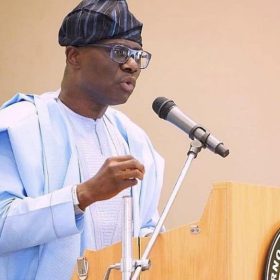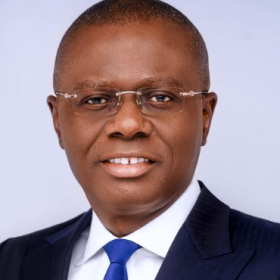Time for Sanwo-Olu to Regulate Lagos Agbero Menace

It is crucial that the administration takes a more serious stance on the persistent issues caused by unruly street urchins posing as tax collectors in Lagos.
Their disruptive behavior, which includes forcefully extracting money from public transportation operators, has created an additional burden on the already high cost of transportation in the city. If the Babajide Sanwo-Olu-led government is genuinely committed to sustainable development in Lagos, it must address this illegal enterprise that has thrived for far too long. The problem extends beyond extorting money from transport operators and encompasses the harassment and forced extortion of private motorists who encounter vehicle breakdowns or require roadside assistance.
The multiple fees regularly collected by these transport unions, commonly referred to as “agbero,” significantly contribute to the inflated cost of commuting within Lagos. This informal system of money changing hands has become deeply rooted in the city and is now spreading to other states, spiraling out of control. Apart from the funds obtained from transport operators, these street collectors also manipulate transport fares within garages to secure higher cuts from drivers. As a result, price hikes of 100 to 200 percent have been recorded in various parts of the state, even before the recent increase in fuel prices.
Efforts by the Lagos State government to consolidate and regulate daily taxes and charges were met with strong resistance from the Lagos National Union of Road Transport Workers (NURTW). The union’s former chairman, Musiliu Akinsanya, who was removed from his position, has since emerged as the chairman of the state-owned Lagos State Taxi Park and Garages. These unruly street collectors have hindered the state’s attempts to establish authority and hold them accountable.
Additionally, this group has gained notoriety for engaging in violence and causing bloodshed as part of their statewide aggression to generate unaccounted revenue from the streets. Incidents of street fights, gun battles, and even killings have occurred, demonstrating the extent of their menace. Despite these criminal acts, successive administrations in Lagos, including during Bola Ahmed Tinubu’s tenure as governor, have seemingly tolerated these rogue elements and failed to enforce the law. This raises questions about the relationship between the leadership of agbero in Lagos State and the ruling party. Why does this group operate with such lawlessness and wield more power and influence than the government? Why does the government show reluctance in enforcing its own environmental laws, which prohibit touting, street trading, and toll collection by miscreants? Who truly controls the streets, the constituted authorities or outlaws, and for what purposes? The pervasive impunity and hypocrisy within Lagos, a mega city, is disconcerting.
Regardless of their current nuisance value, it is imperative for the Babajide Sanwo-Olu-led administration, as well as the political class benefiting from thuggery, to recognize that the commercial hub of Lagos teeters on the edge due to the presence of these rogue elements. The fifth-largest African economy, with its aspirations for infrastructural and economic development, risks losing everything in the face of rampant hooliganism, as seen during the hijacking of the 2020 #EndSARS protests. No matter how ambitious the Lagos Urban Transport Master Plan, Smart City initiatives, foreign direct investments, and private sector innovations may be, they could easily crumble in an environment that fosters and perpetuates drug-addicted street urchins.
On the other hand, a serious administration dedicated to sustainable development and the overall security and welfare of law-abiding citizens cannot continue to indulge criminal activities in any form. Lagosians are burdened from all sides and are economically strained by the high cost of living. One sustainable solution in this era of fuel subsidy removal is the comprehensive review of taxes and charges that are informally paid on a daily basis. The primary focus should be on curbing the forceful.














